-
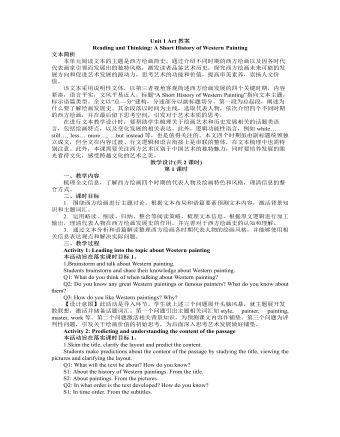
新人教版高中英语选修3Unit 1 Art教案
[2] An important breakthrough…was… [3] Another innovation was … [4] the emphasis increasingly shifted from…to… [5] New ideas and values gradually replaced… [6] While his paintings still had religious themes… … T: All these expressions serve to show how Western painting has developed. Some of them share similar structure but with varied use of words, which makes the text vivid and more readable. 【设计意图】主题类语言整理有助于学生类化语言应用,提高语言输出的丰富性。处理完文本内容信息后,进入语篇信息处理,进行主题相关的词块归类。引导学生快速阅读,寻找表达相同主题(发展或者艺术)的词和短语,再根据词性、用法和结构进行归类,储备主题相关词汇,丰富语言储备,提升语言素养。 Assignment: Go online to gather more information about Chinese painting and write a short history of it. 【设计意图】结合所学,迁移运用,根据实际语境,进行模仿性运用。在此过程中,学生尝试借鉴已学的语言、内容、语篇结构和写作手法来建构新文本,实现语篇输出,同时关注中西艺术文化的差别,加深对优秀文化的认同,培养文化意识。
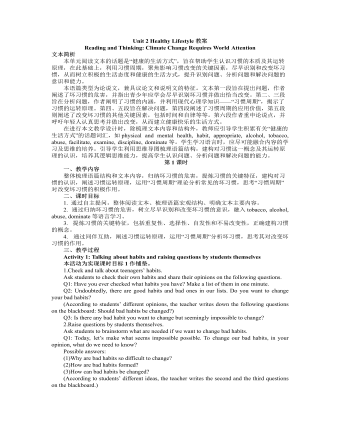
新人教版高中英语选修3Unit 2 Healthy Lifestyle教案
Activity 4: Figuring out the structure and the writing purpose 本活动为实现课时目标2。 1.Read Paragraph 6 and think about its main idea and the writer’s writing purpose. Q1: If you were the author, how would you end your article? “For young people, there is plenty of time to change bad habits. However, there is no “magic pill” or delete button that will help you; you have to think about your bad habits and decide on some changes. You have the power to build a happy and healthy life full of good habits!” Q2: What is Paragraph 6 mainly about? (Possible answer: to appeal to young people including teenagers to change bad habits and live a happy and healthy life.) 2.Think about the writer’s writing purpose and share opinions. Q1: What is the writing purpose? Work in pairs and figure it out. (Possible answer: On the one hand, the passage is written to help teenagers change their bad habits and live a healthy lifestyle. On the other hand, it provides us with a scientific way to identify and analyse our problems objectively, thus strengthening our resolve to tackle the seemingly common yet tough problems in our lives.) 【设计意图】 步骤1旨在预测和验证文章最后一段主要内容,梳理完整的语篇结构,步骤2旨在思考和讨论作者的写作目的。教师也可根据学生课堂反应情况融入对语篇人称多次转换的思考。
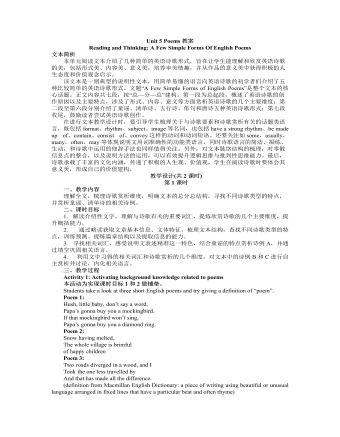
新人教版高中英语选修3Unit 5 Poems教案
本单元阅读文本介绍了几种简单的英语诗歌形式,旨在让学生能理解和欣赏英语诗歌的美,包括形式美、内容美、意义美,培养审美情趣,并从作品的意义美中获得积极的人生态度和价值观念启示。 该文本是一则典型的说明性文本,用简单易懂的语言向英语诗歌的初学者们介绍了五种比较简单的英语诗歌形式。文题“A Few Simple Forms of English Poems”是整个文本的核心话题。正文内容共七段,按“总—分—总”建构。第一段为总起段,概述了英语诗歌的创作原因以及主要特点,涉及了形式、内容、意义等方面赏析英语诗歌的几个主要维度;第二段至第六段分别介绍了童谣、清单诗、五行诗、俳句和唐诗五种英语诗歌形式;第七段收尾,鼓励读者尝试英语诗歌创作。 在进行文本教学设计时,要引导学生梳理关于与诗歌要素和诗歌赏析有关的话题类语言,既包括format、rhythm、subject、image等名词,也包括have a strong rhythm、be made up of、contain、consist of、convey这样的动词和动词短语。
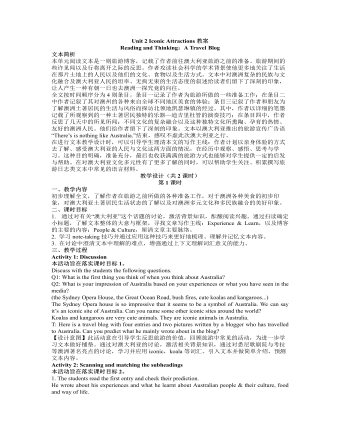
新人教版高中英语选修4Unit 2 Iconic Attractions教案
帮助学生通过讨论与对主题的提升,反思自己的旅游方式,以便做出更优化的安排,在今后的旅程中有更多的收益。 Activity 2: Further discussion of the 6 elements above and supplement of more background knowledge 本活动为实现课时教学目标2。 1.Target Q: The writer’s clear target of traveling, meeting the people and experiencing the culture, is closely related to his major in social studies. Then what is social studies? Social studies is a part of a school or college curriculum concerned with the study of social relationships and the functioning of society and usually made up of courses in history, government, economics, civics, sociology, geography, and anthropology. (Dictionary by Merriam-Webster) Reflection: When you go out to travel, what targets do you usually have in mind? 2.Research Q: Suppose you are traveling to Hangzhou during the school holidays, how will you do research on the city? (surf the internet, read books or travel brochures, consult friends, ...) What information will you be interested to know? (location, iconic sites, local cuisines, interesting customs, shopping malls ...) 3.Abandonment To make the most of time, we have to learn to abandon so that we can accomplish our plan. What will you be interested in doing if you go to Hangzhou if you have a week’s time? What if you only have 2 days? 4~5. Venturing & Experiencing Q: What did he venture to do during the trip? What new experiences did he have? In Sydney: attend his first open-air barbecue, enjoy many different but yummy meals In Catherine: observe the life and customs of the aborigines appreciate their music & try the musical instruments: the didgeridoo
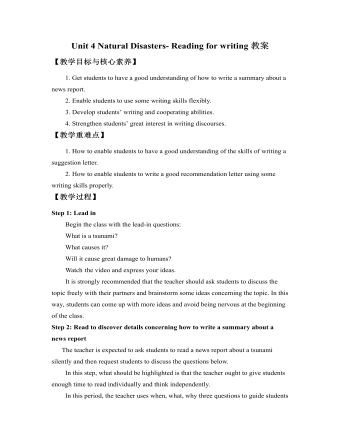
新人教版高中英语必修1Unit 4 Natural Disasters- Reading for writing教案
①标题——标题应当简洁明了。②导语——导语是消息开头的第一段或第一句话,简明扼要地揭示出消息的核心内容。③主体——主体是消息的主要部分,要用充足的事实表现主题,对导语的内容作进一步的展开和阐述。④结束语——通常是对全文内容进行概括性的总结。3. 新闻报道增分句子(1)陈述事实常用的句型:①A terrible storm hit/struck ... , killing ..②It was a cool autumn night when the earthquake happened. A large number of buildings fell down and roads were destroyed, leaving a great many people homeless.地震发生在一个凉爽的秋夜。大量的建筑物倒塌,道路被毁,许多人无家可归。③With the help of the rescue team, people who were the trapped in the flood were saved.在救援队的帮助下,困在洪水中的人们得救了。(2)陈述观点常用的句型:①Clearly/Obviously/In my opinion/It seemed that people were shocked.显然/在我看来/似乎人们震惊了。②The whole city was in ruins after the earthquake.地震后整个城市成了一片废墟。(3)揭示原因常用的句型:Because of/As a result of/Thanks to the help of the army, people who got injured were sent to the hospital immediately.
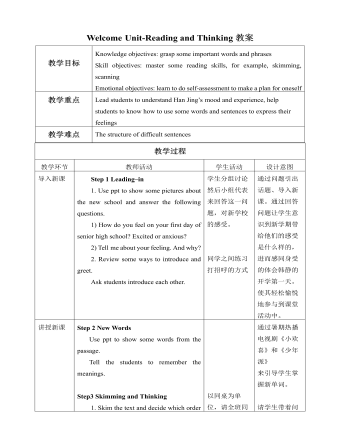
新人教版高中英语必修1Welcome Unit-Reading and Thinking教案
Step 2 New WordsUse ppt to show some words from the passage.Tell the students to remember the meanings.Step3 Skimming and Thinking1. Skim the text and decide which order Han Jing follows to talk about her first day. Time order or place order?Time order2. What is Han Jing worried about before she goes to senior high school?She is worried about whether she will make new friends and if no one talks to her, what she should do.Step 4 Fast Reading1. Match the main ideas with each paragraphParagraph 1:The worries about the new school day Paragraph 2Han Jing’s first maths classParagraph 3Han Jing’s first chemistry classParagraph 4Han Jing’s feelings about her first senior school dayStep 5 Careful Reading1. Fill in the chart with the words and phrases about Han Jing’s day. Answers: Senior high school, a little nervous; Her first maths class, classmates and teachers, friendly and helpful; Chemistry lab; new; great; annoying guy; Confident; a lot to explore2. Read the text again and discuss the questions.1) Why did Han Jing feel anxious before school?Because she was a new senior high student and she was not outgoing. What was more, she was worried about whether she can make friends.2) How was her first maths class?It was difficult but the teacher was kind and friendly. 3) What happened in the chemistry class? What would you do if this happened to you? A guy next to Han Jing tried to talk with her and she couldn’t concentrate on the experiment.
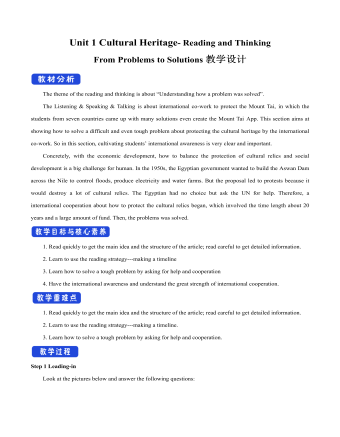
新人教版高中英语必修2Unit 1 Cultural Heritage-Reading and Thinking教案一
The theme of the reading and thinking is about “Understanding how a problem was solved”.The Listening & Speaking & Talking is about international co-work to protect the Mount Tai, in which the students from seven countries came up with many solutions even create the Mount Tai App. This section aims at showing how to solve a difficult and even tough problem about protecting the cultural heritage by the international co-work. So in this section, cultivating students’ international awareness is very clear and important. Concretely, with the economic development, how to balance the protection of cultural relics and social development is a big challenge for human. In the 1950s, the Egyptian government wanted to build the Aswan Dam across the Nile to control floods, produce electricity and water farms. But the proposal led to protests because it would destroy a lot of cultural relics. The Egyptian had no choice but ask the UN for help. Therefore, a international cooperation about how to protect the cultural relics began, which involved the time length about 20 years and a large amount of fund. Then, the problems was solved. 1. Read quickly to get the main idea and the structure of the article; read careful to get detailed information.2. Learn to use the reading strategy---making a timeline3. Learn how to solve a tough problem by asking for help and cooperation4. Have the international awareness and understand the great strength of international cooperation.1. Read quickly to get the main idea and the structure of the article; read careful to get detailed information.2. Learn to use the reading strategy---making a timeline.3. Learn how to solve a tough problem by asking for help and cooperation.

新人教版高中英语必修2Unit 3 The Internet-Discovering Useful Structure教案二
This teaching period mainly deals with grammar “The Present Perfect Passive Voice.” To begin with, teachers should lead students to revise what they have learned about the Present Perfect Passive Voice. And then, teachers move on to stress more special cases concerning this grammar。This period carries considerable significance to the cultivation of students’ writing competence and lays a solid foundation for the basic appreciation of language beauty. The teacher is expected to enable students to master this period thoroughly and consolidate the knowledge by doing some exercises. 1. Guide students to review the basic usages of the Present Perfect Passive Voice2. Lead students to learn to use some special cases concerning the Present Perfect Passive Voice flexibly.2. Enable students to use the basic phrases structures flexibly.3. Strengthen students’ great interest in grammar learning.1. Help students to appreciate the function of the Present Perfect Passive Voice in a sentence2. Instruct students to write essays using the proper the Present Perfect Passive Voice.观察下列句子特点,总结共同点。1.(教材P28)Much has been written about the wonders of the World Wide Web.2.(教材P28)But the Internet has done much more for people than simply make life more convenient.3.(教材P28)Many people have been helped by the club.4.(教材P28)She no longer feels lonely, and her company has become quite successful.5.(教材P32)Today I thought I’d blog about a question that has been asked many times—how do you stay safe online and avoid bad experiences on the Internet?

新人教版高中英语必修2Unit 3 The Internet-Reading for Writing教案二
8. However, the more polite you are, the less likely it is you will be attacked. 然而, 你越有礼貌, 你被攻击的可能性就越小。 Step 8 Writing---the articleHow to stay safe in the online chat roomToday I thought I’d blog about a question that has been asked many times--- how do you stay safe online and avoid bad experiences in the online chat room ? I’m not an expert, but many years as a blogger have taught me a thing or two.First of all, there’s the golden rule of the Internet: keep out of what makes you uneasy. Don’t post comments or click on anything. Second, protect your privacy. Don’t give out too much private information like your address, phone numbers, the ID numbers, etc. Third, be polite. If you are polite to others on the Internet, you won’t be attacked in normal situation. Finally, don’t believe in others easily and never meet someone you met online alone. It is very dangerous.Have you had any bad experiences online, or do you have some good advice for staying safe? Post your comments below!Step 9 Pair workExchange drafts with a partner. Use this checklist to help your partner revise his/her draft.1. Does the writer tell the reader what he/she know about the topic ?2. Are the tips and suggestions well organised ?3. Has the writer defined the new words ?4. Does the author include examples, comparison, or explanations ?5. Does the writer end by asking readers to leave comments and/or suggestions ?6. Can you find any grammar or spelling mistakes.Step 6 HomeworkPut up your revised draft in the classroom or read it to your class.

新人教版高中英语必修2Unit 5 Music-Discovering Useful Structures教案二
4. When he got absorbed in his world of music, he felt as if he could “see” the beauty of the world around him, like he had in his previous life.P·P as adverbial: _________________________________________________________________.Function: _______________________________________________________________________.Step 5 Solid Complete the passage with the words in brackets in their correct forms.Well known as a successful band, the Impact members show quite a few striking qualities. They never ever give up. When _____________(question) by the media, they are not _____________(discourage) and practise even harder. They are improving themselves by attending several master training class. They are united. _____________(fill with) team spirit, they act as a whole, always aiming for glory. Step 6 Difference and similarity from -ingObserve the following examples.1. He went out, shutting the door behind him.=He went out, ________________________________________________________.2. Not knowing what to do, he went to his parents for help.=__________________________________________, he went to his parents for help.Similarity: _______________________________________________________________________________________________________________________________________________________.Difference : _______________________________________________________________________________________________________________________________________________________.Step Practice1. ________ in a hurry, this article was not so good. 因为写得匆忙, 这篇文章不是很好。2. ________ carefully, he found something he hadn’t known before. 他仔细读书时, 发现了一些从前不知道的东西。3. ________ why he did it, the monitor said it was his duty. 当被问及他为什么要这么做时, 班长说这是他的职责
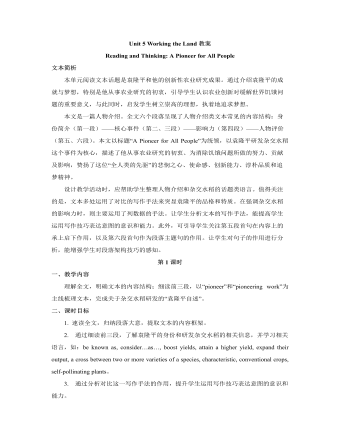
新人教版高中英语选修1Unit 5 Working the Land教案
1. 完成文本主要信息填空(斜体字部分设空):As a witness to farmers’ poor harvests and even a severe shortage of food, Yuan Longping was determined to devote his life to tackling this crisis. After graduation, he realized that what farmers needed most was to boost yields in the fields. Yuan was convinced that the answer lay in the creation of hybrid rice, one characteristic of which is that it usually achieve higher output than conventional crops. However, it was no easy job. The first difficulty he needed to overcome was scientists’ general assumption that this could not be done. Through trial and error, Yuan managed to generate this incredible crop. It is estimated that about 60 percent of domestic rice consumption in China was comprised of crops generated from Yuan’s hybrid strains. His innovation has enabled Chinese farmers to considerably expand their output and helped feed the world. Unwilling to retire early to a life of leisure and unconcerned about celebrity or fortune, Yuan continues to turn one vision after another into realities.2. 模仿写作:Do some research via the Internet and introduce another agricultural scientist, Chen Risheng(陈日胜), using the structure, expressions and writing techniques you have learnt from the text “A Pioneer for All People”.【设计意图】任务1是对文本内容和词汇学习成效的检测。任务2借助文本中学到的词汇和写作手法仿写另一位科学家,提升学生迁移运用词汇、文体结构和写作方法的能力。

新人教版高中英语必修3Unit 5 The Value of Money-Discovering Useful Structures导学案
4.They were going to find someone to take part in their bet when they saw Henry walking on the street outside.[归纳]1.过去将来时的基本构成和用法过去将来时由“would+动词原形”构成,主要表示从过去某一时间来看将要发生的动作(尤其用于宾语从句中),还可以表示过去的动作习惯或倾向。Jeff knew he would be tired the next day.He promised that he would not open the letter until 2 o'clock.She said that she wouldn't do that again.2.表示过去将来时的其他表达法(1)was/were going to+动词原形:该结构有两个主要用法,一是表示过去的打算,二是表示在过去看来有迹象表明将要发生某事。I thought it was going to rain.(2)was/were to+动词原形:主要表示过去按计划或安排要做的事情。She said she was to get married next month.(3)was/were about to+动词原形:表示在过去看来即将要发生的动作,由于本身已含有“即将”的意味,所以不再与表示具体的将来时间状语连用。I was about to go to bed when the phone rang.(4)was/were+现在分词:表示在过去看来即将发生的动作,通常可用于该结构中的动词是come,go,leave,arrive,begin,start,stop,close,open,die,join,borrow,buy等瞬间动词。Jack said he was leaving tomorrow.
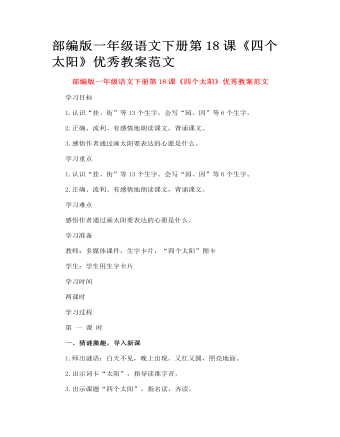
部编版一年级语文下册第18课《四个太阳》优秀教案范文
猜谜激趣,导入新课 1.师出谜语:白天不见,晚上出现。又红又圆,照亮地面。 2.出示词卡“太阳”,指导读准字音。 3.出示课题“四个太阳”,指名读,齐读。 4.引导质疑:读了课题,你的小脑瓜里是不是蹦出了小问号? 二、初读课文,认记生字 1.出示课件:带拼音生字,指名带读。 2.出示课件:去拼音生字并打乱顺序,摆字卡,自由练习朗读。 3.游戏:我说你找喊名字。 4.指导识记生字方法。 5.巩固游戏:我把生字送回家。动画演示,指导写字 1.猜谜引入:大口框里有个“大” 2.出示课件:“因”书写笔顺规则 看了动画,你知道了什么? 3.出示课件:“园” “园”与“因”哪里长得很像?书写的时候要注意些什么?(同样先里面后封口) 4.师范写“园”“因”,讲解书写要领。 5.生自由练写,师巡回指导。 6.集体评价。
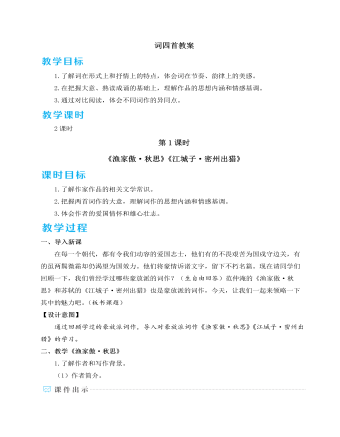
人教部编版语文九年级下册词四首教案
词人如此有违常规,造成了一种拗峭不凡的气势,词意更加纵横驰骋,抒情更加酣畅淋漓。2.如何理解《满江红》(小住京华)中的“俗子”?从这首词的语境来看,“俗子”当指词人的丈夫。这与“八年风味”的婚姻反思,与“青衫湿”的悲情是前后呼应的。秋瑾在后来写的一首《沁园春》中说:“有多少,遇王郎天壤,辜负才华。”在长篇弹词《精卫石》中说:“道韫文章男不及,偏遇个天壤王郎冤不冤。”这些词句,都是借谢道韫所嫁非人,间接抒发了她对婚姻的失望。王郎天壤(天壤王郎),是谢道韫鄙薄她丈夫王凝之的话,出自《世说新语·贤媛》:“一门叔父,则有阿大、中郎;群从兄弟,则有封、胡、遏、末,不意天壤之中,乃有王郎!”当然,从广义上理解,这首词中的“俗人”,也可泛指世俗之人。秋瑾到日本后写的《鹧鸪天》词中,有“祖国沉沦感不禁,闲来海外觅知音”的词句,可见“觅知音”意指寻求救国之道,不一定指个人的情感问题。
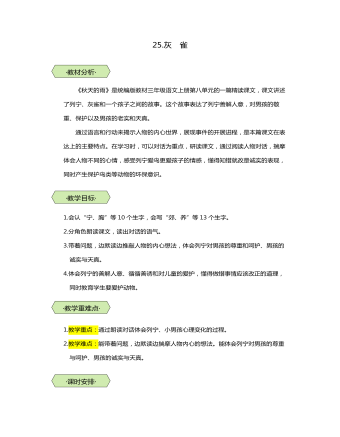
统编版三年级语文上第25课灰雀教学设计教案
《秋天的雨》是统编版教材三年级语文上册第八单元的一篇精读课文,课文讲述了列宁、灰雀和一个孩子之间的故事。这个故事表达了列宁善解人意,对男孩的敬重、保护以及男孩的老实和天真。通过语言和行动来揭示人物的内心世界,展现事件的开展进程,是本篇课文在表达上的主要特点。在学习时,可以对话为重点,研读课文,通过阅读人物对话,揣摩体会人物不同的心情,感受列宁爱鸟更爱孩子的情感,懂得知错就改是诚实的表现,同时产生保护鸟类等动物的环保意识。 1.会认“宁、胸”等10个生字,会写“郊、养”等13个生字。2.分角色朗读课文,读出对话的语气。3.带着问题,边默读边推敲人物的内心想法,体会列宁对男孩的尊重和呵护、男孩的诚实与天真。4.体会列宁的善解人意、循循善诱和对儿童的爱护,懂得做错事情应该改正的道理,同时教育学生要爱护动物。 1.教学重点:通过朗读对话体会列宁、小男孩心理变化的过程。2.教学难点:能带着问题,边默读边揣摩人物内心的想法。能体会列宁对男孩的尊重与呵护、男孩的诚实与天真。 2课时
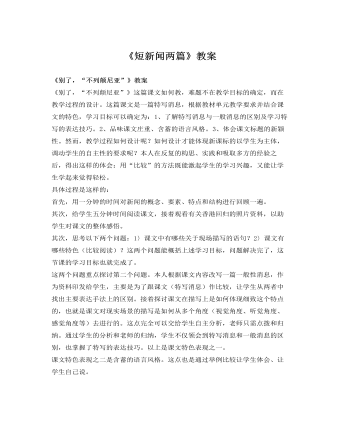
人教版高中语文《短新闻两篇》教案
罗森塔尔突破了“客观报道”“零度写作”的框框,把自己和其他参观者在奥斯维辛访问时的感受当做文章的主要内容来写,传达出每一个良知者的共同心声。教师总结:细节描写是耐人寻味的。文章没有阴森恐怖的镜头,没有血腥的画面,只是重现了新闻的事实真相,但透过细节却能引发人们对生命,对人性的思考。在作者看似平静的叙述中抒发了对德国纳粹残酷暴行的沉重控诉,更表达了作者对自由、和平与祥和的向往四、拓展延伸:《奥斯维辛没有什么新闻》这一作品本身的价值在哪?社会价值又在哪,能不能从这两个角度思考,几人合作试写一段颁奖词?范例:《奥斯维辛没有什么新闻》突破新闻“零度写作”原则,着眼细节,以冷峻的视角,深沉地描述了今天的奥斯维辛集中营纪念馆。在恐怖与快乐、战争与和平、历史与现实的反差中,它召唤起人们关于灾难的记忆、关于生命的思考、关于人性的自省。它的发表充分地表现了一个新闻记者的使命感,更以迫人的力量震撼生者的心,成为新闻史不朽的名篇。
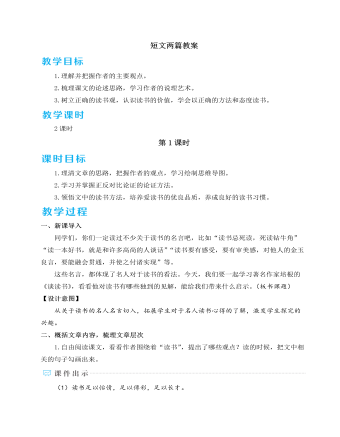
人教部编版语文九年级下册短文两篇教案
一、新课导入同学们,你们一定读过不少关于读书的名言吧,比如“读书忌死读,死读钻牛角”“读一本好书,就是和许多高尚的人谈话”“读书要有感受,要有审美感,对他人的金玉良言,要能融会贯通,并使之付诸实现”等。 这些名言,都体现了名人对于读书的看法。今天,我们要一起学习著名作家培根的《谈读书》,看看他对读书有哪些独到的见解,能给我们带来什么启示。(板书课题)【设计意图】从关于读书的名人名言切入,拓展学生对于名人读书心得的了解,激发学生探究的兴趣。二、概括文章内容,梳理文章层次1.自由阅读课文,看看作者围绕着“读书”,提出了哪些观点?读的时候,把文中相关的句子勾画出来。(1)读书足以怡情,足以傅彩,足以长才。(2)读书时不可存心诘难作者,不可尽信书上所言,亦不可只为寻章摘句,而应推敲细思。(3)书有可浅尝者,有可吞食者,少数则须咀嚼消化。(4)读书使人充实,讨论使人机智,作文使人准确。(5)读史使人明智,读诗使人灵秀,数学使人周密,科学使人深刻,伦理学使人庄重,逻辑修辞之学使人善辩:凡有所学,皆成性格。
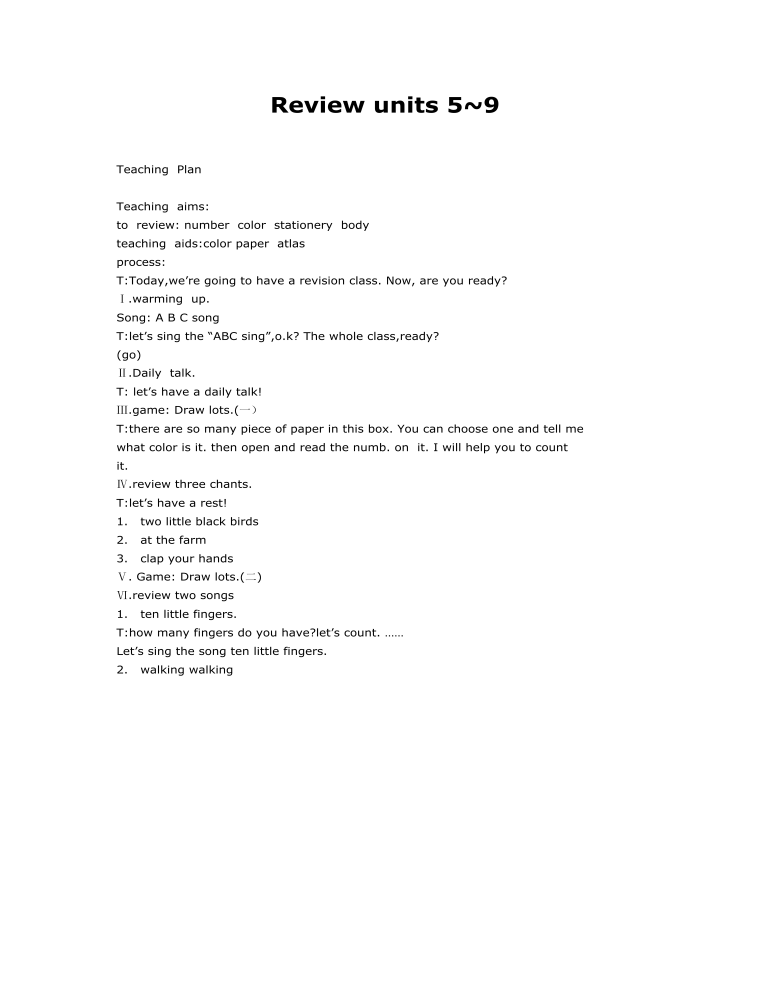
大班英语教案:Review units 5~9
T:Today,we’re going to have a revision class. Now, are you ready?Ⅰ.warming up.Song: A B C songT:let’s sing the “ABC sing”,o.k? The wholeclass,ready?(go)Ⅱ.Daily talk.T: let’s have a daily talk!Ⅲ.game:Draw lots.(一)T:there are so many piece of paper in this box.You can choose one and tell me what color is it. then open and read the numb.on it. I will help you to count it.
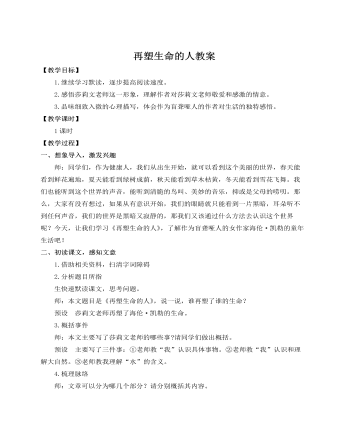
人教部编版七年级语文上册再塑生命的人教案
海伦·凯勒一岁多时不幸染上疾病,致使她双目失明、双耳失聪,随之又丧失了说话的能力。从此,她坠入了一个黑暗而沉寂的世界,陷入了痛苦的深渊。17岁,海伦·凯勒考进哈佛大学,还掌握了英、法、德、拉丁和希腊五种语言。大学期间,她开始写作。毕业后,她把自己的一生献给了盲人福利和教育事业,并在繁忙的工作中先后完成了14部具有世界影响的著作,最著名的是其自传《假如给我三天光明》。海伦·凯勒无比敬爱和感激自己的老师莎莉文,她说:“假如给我三天光明,我首先要长久地凝视我的老师——安妮·莎莉文!”海伦把自己的学习分成四个步骤:1.每天用三个小时自学。2.用两个小时默记所学的知识。3.再用一个小时的时间将自己用三个小时所学的知识默写下来。4.剩下的时间她运用学过的知识练习写作。在学习与记忆的过程中,她只有一个信念:她一定能够把自己所学习的知识记下来,使自己成为一个有用的人。她每天坚持学习10个小时以上,经过长时间的刻苦学习,她掌握了大量的知识,能熟练地背诵大量的诗词和名著的精彩片段。
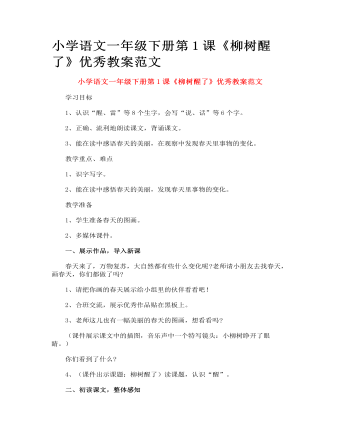
小学语文一年级下册第1课《柳树醒了》优秀教案范文
朗读背诵,感悟课文 1、你从什么地方知道柳树醒了?分小组交流交流。 (根据学生的回答依次学习相应小节。) 2、学生在读书交流中,随机出示课件中相应小节,帮助领悟,读好“醒、软、绿、飞、高”等词。 第一节:(课件出示:天空春雷一声响,地下一棵棵柳树摇了摇身子。) 想象:春雷会跟柳树说什么? 第二节:(课件出示:春雨沙沙,柳枝渐渐吐绿,向下垂。) 你觉得这一小节该怎样读呢? 第三节:(课件出示:春风吹动柳枝,柳枝飘荡) 引读,你们瞧!春风给柳树梳头,梳着梳着——(生读)。 第四节:谁想读第四节?谁知道“小柳絮”是什么样儿的?理解“柳絮”:(课件出示:一双燕子在空中飞来飞去,柳树上沾满上面结满有白色绒毛的种子,绒毛随风飞散。) 第五小节:(课件出示:柳树枝条在风中飘荡,孩子们在树下玩耍。)看,小柳树醒了,它在干什么?会班齐读。 3、再读读课文,想想:你从哪里知道“柳树醒了”?“柳树醒了”说明什么? 4、和同桌小伙伴一起试着背背课文,比比谁先会背。(课件出示课文插图,同时配乐。)




